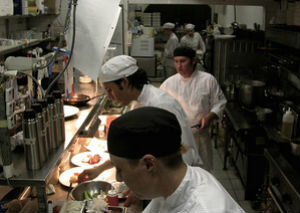When you eat at a restaurant, you may schmooze the maître d' or flirt with the server, but do you give any thought to how your order actually gets to you? These three books (including one by the server you flirted with) may open your eyes.
Chop Chop is a novel by Simon Wroe, who no doubt drew on his own experiences working in a restaurant, but hopefully not too much. Monocle (so called because of his recently-acquired English degree) is in serious need of money and finds a job as the lowest man on the totem pole in a restaurant that has seen better days. As he learns the daily grind of the kitchen, he makes character studies of the outsize personalities who slave, belittle, and sexually harass there. A sinister character known only as the Fat Man starts paying good money for the chefs to cook increasingly offensive dishes at his residence and provides the climax to the book. While full of information including a glossary of kitchen terms and an evolving list of collective nouns (a skulk of foxes, an ogle of waitresses), this book whips past at soufflé-spraying speed. If you like your comedy dark and soigne, this might be the book for you.
George Orwell, for all his dystopian works, considered himself a socialist. It's not hard to see why: Down and Out in Paris and London describes appalling poverty in both glamorous cities. While technically a novel, most critics hold that this work is largely autobiographical. Eric Blair (Orwell) takes a job (one of many) as a dishwasher in a hotel in Paris and proceeds to document the eccentrics and the lunatics he encounters there. You may look askance at your next order from an upscale establishment, as Orwell also describes the filth of the kitchen in the posh hotel where he works. While a sobering look at the conditions of the working and underclass, it is nonetheless a very funny book.
Remember your server, that smiling, oblique creature? Waiter Rant tells you what's really going on behind that vague smile. Steve Dublanica was a waiter for several years before finding his vocation as a writer, and he writes of the wars, whether that of customers snorting cocaine off bathroom floors, heart attacks in the dining room (and the demands of a patron to be seated in that section of the restaurant right now), or the common lie that "I'm a friend of the owner." Not that the employees are all saints: the manager demands bribes for the best sections and hours, the chefs are nuts, and the staff find inventive ways to get revenge on boorish customers. Among other tips, Dublanica says that the way to judge the cleanliness of the kitchen is by the state of the bathroom. Want more? Read this cynical, hilarious book.




Add a comment to: Writers in Restaurants